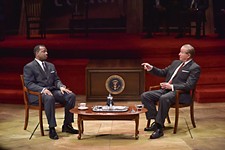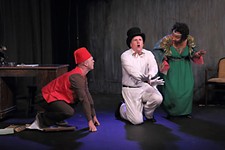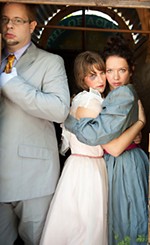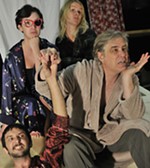MilkMilkLemonade
A gay elementary school love story with palpable resonance for everyone
Reviewed by Barry Pineo, Fri., Sept. 17, 2010
MilkMilkLemonade
The Vortex, 2307 Manor Rd., 478-5282 www.shrewdproductions.com
Through Sept. 26
Running time: 1 hr., 10 min.
We forget some things until we're reminded. Hearing the title of this play, I couldn't finish the rhyme I knew I'd heard before, and when someone else said it aloud, I remembered it.
"Milk, milk, lemonade. 'Round the corner fudge is made." With accompanying hand motions.
In this Shrewd Productions rendition of Joshua Conkel's play, the actors put themselves on the line, and the story stays with you after you leave. Oh yes, it stays with you, for while the story is familiar – young innocent finding his true self with the aid of a spirit guide – the genre is not: This is, I can say with certainty, the only gay elementary school love story I have ever seen.
Hopefully, the phrase "gay elementary school love story" sets up a dissonance in you. That dissonance might compound when you consider that adults play the two preadolescent boys. Xaq Webb's Emory wants to play with his doll; talk to his chicken, Linda; and win a television talent contest. His Nanna, in a spooky performance by Chris Humphrey, wants him, as she says, to stop acting like a faggot and play the role God assigned him. And the neighborhood bully, Jericho Thorp's Elliot, beats up on him in public and coerces him to pack fudge in private.
Occasionally, you'll find a play that forces the actors out on a limb, whether they want to go there or not, and you have to accompany them. Fortunately, these actors seem to understand how the text works for them, so traveling the tree with them is easy. Conkel paints all the characters broadly, but director Jason Hays only asks Joe Hartman, who plays Linda the Chicken as a cross between Carmen Miranda and Ethel Merman, and Shannon Grounds, playing multiple roles, including a ravenous spider and an evil twin growing in Elliot's thigh, to go for full-blown campiness. Webb, Thorp, and Humphrey, if anything, underplay their more human roles. The message about freedom in gender roles is so baldly painted on the story's surface the actors don't need to paint it broadly. They just need to trust it, and they do. Conkel's script touches on myriad topics outside gender, yet even the material about urban sprawl and factory farming resonates within the main theme: We tend to want to homogenize, to make everything the same, to reduce everything to a common denominator, and this dehumanization, this objectification, goes against our basic nature.
The message of this bizarre play, in which a chicken needs a translator except when she's performing stand-up comedy, is simple: We should allow everyone to be whomever they feel they need to be. Emory is happy when he's dancing and playing with his doll. Elliot is unhappy because he feels he has to deny his homosexual desires. We can try to shove people into convenient holes and hate them for the hole we've put them in, or we can accept the fact that we are, all of us, different and, thus, unique. It comes down to respecting the individual's right to live a life free from the threat of being condemned – for their sexuality, for the color of their skin, for their religion. So strange to encounter a gay elementary school love story – any gay elementary school love story – with such immediate and palpable resonance.











